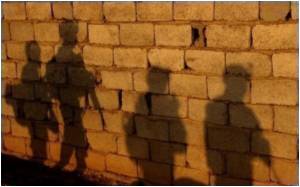Japan, whose people have been widely applauded for their discipline in the face of appalling adversity, is facing a stern test as isolated reports of looting by desperate tsunami survivors

In stark contrast to the chaos and violence that followed last year's quake in Haiti or Hurricane Katrina in New Orleans in 2005, the response to Japan's worst natural disaster since 1923 has been a showcase for the restraint and resilience of one of the world's most stable societies.
Despite chronic food and water shortages in the worst-affected areas, even abandoned vending machines went untouched, their edible contents still sitting behind their transparent fronts.
But now, more than a week after the tsunami hit, police say some incidents of looting and theft are being reported from battered and abandoned homes and stores.
The phenomenon is rare in Japan, a country where police crack down hard on petty crime and residents are rewarded with a finder's fee for returning lost or stolen items. Tales of misplaced wallets being returned are legendary.
"Since we have been so busy with the search and rescue operations and then the clean-up, it's hard for us to be aware of everyone who is looting," said Hironori Kodashima, vice-chief of police in the small, badly hit fishing port of Kamaishi in northeastern Iwate prefecture.
Advertisement
"Generally speaking, people are looting due to lack of food and money. Thieves break in and loot homes because they have been abandoned and nobody is living there any more," he said.
Advertisement
Masayuki Sasaki, 42, lost his mother to the tsunami that almost obliterated the town of Rikuzentakata, some 50 kilometres (30 miles) south of Kamaishi.
He and his widower father returned to the flattened remains of their home to try and salvage anything useful or personal.
But, Sasaki complained, survivors and rescuers were not the only ones hunting around.
"I can cope with living in the refugee centre and all that, but what I really can't stand is the thieves who come here," he said.
"They pretend to be helping, but they're looking for money, or maybe for bank books. I have lost everything and they come here looking for money. It's disgusting."
The vast majority of Japanese have remained calm and stoical, putting up with difficult conditions at evacuation shelters and waiting patiently in line for hours at gas stations and outside supermarkets running low on supplies.
And what theft has taken place has generally been low-level, including cases of people siphoning fuel out of abandoned vehicles.
Nevertheless, some people have still been appalled that any crimes have been committed at all at a time when people are trying to pull together -- and in a usually safe country where such behaviour is not common.
"Is it safe now? No, in fact you can?t say it's safe," said Ayako Ito, 84, whose mountainside home overlooking Kamaishi was high enough to be spared the ravages of the tsunami.
"People who see the thieves scream 'Stop it, stop it!' It's best to not go far from your house because our belongings are inside," said Ito, who had only eaten one rice ball all day and said she was suffering from the cold at night with no power or electricity.
Masuya Misato, 33, a volunteer worker in Kamaishi, said he had witnessed several cases of smash-and-grab raids.
"They steal items from stores and cash from the destroyed houses. They also steal beer and cigarettes," Misato said.
"There are cars everywhere that were swept away by the tsunami, and since they have been abandoned, they steal gas," he added.
"It's shocking and I hope it stops soon."
Source-AFP








